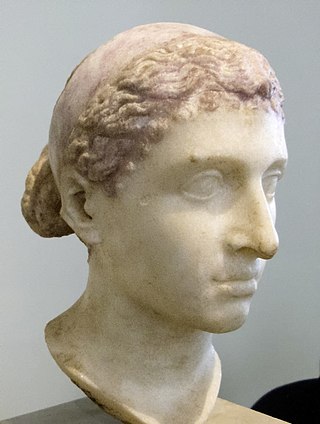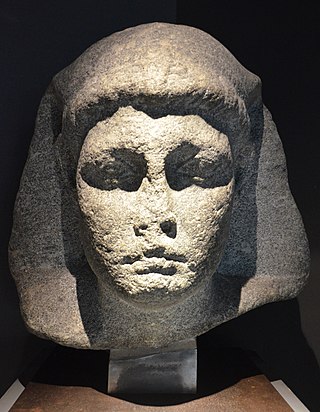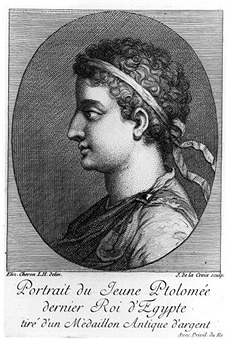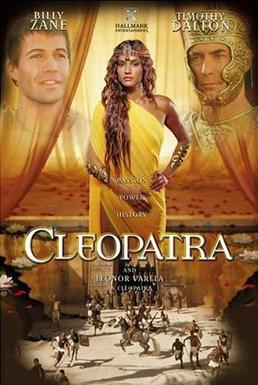
The Battle of Actium was a naval battle fought between Octavian's maritime fleet, led by Marcus Agrippa, and the combined fleets of both Mark Antony and Cleopatra. The battle took place on 2 September 31 BC in the Ionian Sea, near the former Roman colony of Actium, Greece, and was the climax of over a decade of rivalry between Octavian and Antony.

Marcus Antonius, commonly known in English as Mark Antony, was a Roman politician and general who played a critical role in the transformation of the Roman Republic from a constitutional republic into the autocratic Roman Empire.
This article concerns the period 39 BC – 30 BC.

This article concerns the period 49 BC – 40 BC.
Year 34 BC was either a common year starting on Friday, Saturday or Sunday or a leap year starting on Friday or Saturday of the Julian calendar and a common year starting on Friday of the Proleptic Julian calendar. At the time, it was known as the Year of the Consulship of Antonius and Libo. The denomination 34 BC for this year has been used since the early medieval period, when the Anno Domini calendar era became the prevalent method in Europe for naming years.
Year 30 BC was either a common year starting on Wednesday, Thursday or Friday or a leap year starting on Thursday of the Julian calendar and a common year starting on Wednesday of the Proleptic Julian calendar. At the time, it was known as the Year of the Consulship of Octavian and Crassus. The denomination 30 BC for this year has been used since the early medieval period, when the Anno Domini calendar era became the prevalent method in Europe for naming years.

Cleopatra VII Thea Philopator was Queen of the Ptolemaic Kingdom of Egypt from 51 to 30 BC, and its last active ruler. A member of the Ptolemaic dynasty, she was a descendant of its founder Ptolemy I Soter, a Macedonian Greek general and companion of Alexander the Great. Her first language was Koine Greek, and she is the only Ptolemaic ruler known to have learned the Egyptian language. After her death, Egypt became a province of the Roman Empire, marking the end of the last Hellenistic-period state in the Mediterranean, a period which had lasted since the reign of Alexander.

Alexander Helios was a Ptolemaic prince and son of Pharaoh Cleopatra VII of the Ptolemaic dynasty and Roman triumvir Mark Antony. Alexander's fraternal twin sister was Cleopatra Selene II. Cleopatra named her son after Alexander the Great. His second name in Ancient Greek means "Sun"; this was the counterpart of his twin sister's second name Selene (Σελήνη), meaning "Moon".

Ptolemy XV Caesar, nicknamed Caesarion, was the last pharaoh of Ptolemaic Egypt, reigning with his mother Cleopatra VII from 2 September 44 BC until her death by 12 August 30 BC, then as sole ruler until his death was ordered by Octavian.
Ptolemy Philadelphus was a Ptolemaic prince and was the youngest and fourth child of Greek Ptolemaic Queen Cleopatra VII of Egypt, and her third with Roman Triumvir Mark Antony.

Ptolemy XIII Theos Philopator was Pharaoh of Egypt from 51 to 47 BC, and one of the last members of the Ptolemaic dynasty. He was the son of Ptolemy XII and the brother of and co-ruler with Cleopatra VII. Cleopatra's exit from Egypt caused a civil war to break out between the pharaohs. Ptolemy later ruled jointly with his other sister, Arsinoe IV.
Lucius Pinarius Scarpus was a Roman who lived during the late Republic and the early Empire. He served as the Roman governor of Cyrene, Libya during the War of Actium. He was originally loyal to Mark Antony, but eventually switched sides and joined Octavian following the latter's victory at the Battle of Actium in 31 BC.

Cleopatra Selene II was a Ptolemaic princess, Queen of Numidia and Mauretania and Queen of Cyrenaica. She was an important royal woman in the early Augustan age.

The War of Actium was the last civil war of the Roman Republic, fought between Mark Antony and Octavian. In 32 BC, Octavian convinced the Roman Senate to declare war on the Egyptian queen Cleopatra. Her lover and ally Mark Antony, who was Octavian's rival, gave his support for her cause. Forty percent of the Roman Senate, together with both consuls, left Rome to join the war on Antony's side. After a decisive victory for Octavian at the Battle of Actium, Cleopatra and Antony withdrew to Alexandria, where Octavian besieged the city until both Antony and Cleopatra were forced to commit suicide.
The Battle of Alexandria was fought on July 1 to July 30, 30 BC between the forces of Octavian and Mark Antony during the last war of the Roman Republic. In the Battle of Actium, Antony had lost the majority of his fleet and had been forced to abandon the majority of his army in Greece, where without supplies they eventually surrendered. Although Antony's side was hindered by a few desertions, he still managed to narrowly defeat Octavian's forces in his initial defence. The desertions continued, however, and, in early August, Octavian launched a second, ultimately successful, invasion of Egypt, after which Antony and his lover, Cleopatra, committed suicide.

The Battle of the Nile in early 47 BC saw the combined Roman–Egyptian armies of Julius Caesar and Cleopatra VII defeat those of the rival Queen Arsinoe IV and King Ptolemy XIII and secure the throne of Egypt.

Cleopatra is a 1999 miniseries adaptation of Margaret George's 1997 historical fiction novel The Memoirs of Cleopatra. Produced by Hallmark Entertainment, it stars Leonor Varela as the Egyptian queen Cleopatra, Timothy Dalton as Julius Caesar, Billy Zane as Mark Antony, Rupert Graves as Octavius, Sean Pertwee as Brutus and Bruce Payne as Cassius. Cleopatra was shown first on the ABC television network in two parts on two consecutive evenings in May 1999 and then released on videotape and DVD. Judy Farr, Martin Hitchcock and Frank Walsh were nominated for an Emmy in 1999 for outstanding art direction for a miniseries or a movie for their work on Cleopatra.

Antony's Atropatene campaign, also known as Antony's Parthian campaign, was a military campaign by Mark Antony, the eastern triumvir of the Roman Republic, against the Parthian Empire under Phraates IV.

Cleopatra VII, the last ruler of Ptolemaic Egypt, died on either 10 or 12 August, 30 BC, in Alexandria, when she was 39 years old. According to popular belief, Cleopatra killed herself by allowing an asp to bite her, but according to the Roman-era writers Strabo, Plutarch, and Cassius Dio, Cleopatra poisoned herself using either a toxic ointment or by introducing the poison with a sharp implement such as a hairpin. Modern scholars debate the validity of ancient reports involving snakebites as the cause of death and whether she was murdered. Some academics hypothesize that her Roman political rival Octavian forced her to kill herself in a manner of her choosing. The location of Cleopatra's tomb is unknown. It was recorded that Octavian allowed for her and her husband, the Roman politician and general Mark Antony, who stabbed himself with a sword, to be buried together properly.

The reign of Cleopatra VII of the Ptolemaic Kingdom of Egypt began with the death of her father, Ptolemy XII Auletes, by March 51 BC. It ended with her suicide in August 30 BC, which also marked the conclusion of the Hellenistic period and the annexation of Egypt into a Roman province. In the style of her Greek predecessors, Cleopatra reigned over Egypt and other territories as an absolute monarch, although the Roman Republic frequently interfered in its internal affairs. Her personal rule of Egypt was characterized by a continued reliance on agriculture, extensive trade and conflict with other states, the tackling of corruption, strategic management of the bureaucracy, and ambitious building projects.














